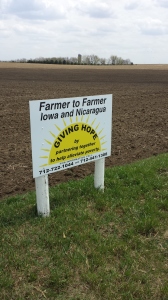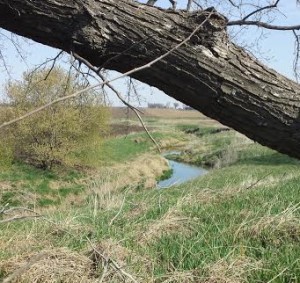Thursday, April 16, 2015 – Granville, Iowa
{Celebrate the completion of the Iowa Pipeline Walk with an Earth Day Rally to Stop the Pipeline, Wednesday, April 22 from 5:00-6:00 p.m. at Locust and E. 7th in Des Moines. For the latest route and schedule detail, click here.}
BANG! The crack of a gun less than 30 yards away stopped me dead in my tracks. Startled, I yelled with a mix of seriousness and levity, “Hello! Don’t shoot!”
A middle-aged woman holding a shotgun appeared from behind a stand of spruce trees. She yelled back to me, “You’re that guy I saw on the news.”
“Yes, probably, maybe. Why? A lot of guys look like me, don’t ya think?” I responded. “Are you going to shoot me?” I continued, with greater emphasis on levity than seriousness, hoping a touch of humor might influence the best possible outcome.
The woman laughed, explaining that she was just enjoying a little target practice, that my arrival was a coincidence. She’d seen the story of my walk on two Sioux City television stations.
She’d already settled with Dakota Access, she explained. But like many others I’d met, she wasn’t particularly pleased with the thought of half a million barrels of oil running through her farm every day. And like others, she felt it was inevitable, that there was no sense fighting it, that she might as well settle.
I told her about the many landowners standing against the pipeline. I told her the company doesn’t even have a permit or the authority to use eminent domain. I told her about the legislation now working its way through the House and Senate. (It’s SSB 1276 – check it out by clicking here . . . and take action!)
Therein lies our biggest challenge. We have to stand united with landowners opposed to the pipeline, and we have to convince others that this fight is not over. Heck, it’s not even close to over. I’ve seen lots of corporate hubris in my day, but Dakota Access steals the cake.
Yup. Corporate hubris on steroids. More on that tomorrow.
I have to mention one other experience from today. Halfway through the 13-mile walk, I stopped at a beautiful, orderly mixed-use farm. I had barely introduced myself to the family when I was invited to join them at their table for lunch. Burning 2,000 additional calories a day, I rarely decline an offer involving food.
In addition to discussing the pipeline, I was delighted to learn of the family’s efforts through their church to help struggling farmers in Nicaragua. It was a reminder to me that Iowans care about their neighbors, whether they’re across a fence line or an international border.
As we work to build new allies in this fight against the pipeline, we need to remind ourselves of Iowans’ deep-rooted sense of neighborliness and concern for others. If we are to succeed, that will be a key element in making it happen.

